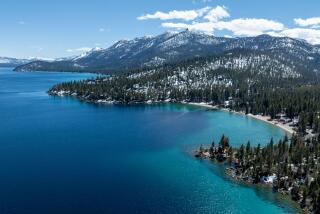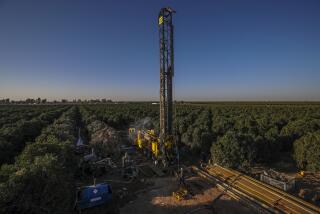U.S. and Canada Study Low Levels of Great Lakes
- Share via
WASHINGTON — American and Canadian officials are looking back to the warm winter of 1997-98 to explain low Great Lakes levels that are expected to dip even lower this summer.
Officials at the International Joint Commission said Friday that the El Nino effect allowed extra water to evaporate from the warmer-than-average lakes, leading to levels that in some cases are the lowest in a generation. The International Joint Commission is an independent U.S.-Canada organization established by treaty to help manage shared waterways.
During the last year alone, those “unique climate conditions” have meant that “the entire system is down significantly,” said Tom Baldini, chairman of the commission’s U.S. Section.
* Lake Superior dropped by 8 inches to its lowest level for May since 1990.
* Lake Michigan and Lake Huron dropped about 26 inches to a level not seen since 1990.
* Lake Erie’s average level dipped by 22 inches to a level last seen in 1990.
* Lake Ontario’s level dropped by 29 inches, to levels last logged in 1965.
According to Baldini’s Canadian counterpart, Leonard Legault, Lake Erie probably already has reached its spring peak, but Lakes Superior, Michigan, Huron and Ontario were expected to rise a bit before dropping again, as the lakes typically do in the summer.
Much will depend on how much rain the area experiences between now and autumn.
“There are two factors that have been driving this decline: precipitation and temperature,” Baldini said.
The air has been warmer and precipitation lighter than average over the last fall and winter, adding to the El Nino-attributed declines of the previous year, he explained.
For the people who use the lakes, low levels can produce myriad difficulties, Baldini and other commission members said.
Pleasure boaters can have trouble reaching their docks or island getaways because the water isn’t deep enough to accommodate them; the taste and smell of water taken from the lakes can change; commercial shippers can be forced to carry less freight to avoid scraping the bottom in shallower ports.
To accommodate an expected barrage of dredging-permit requests, the approval process will be expedited so that marina dredging can begin in a matter of weeks rather than months.
More to Read
Sign up for Essential California
The most important California stories and recommendations in your inbox every morning.
You may occasionally receive promotional content from the Los Angeles Times.













